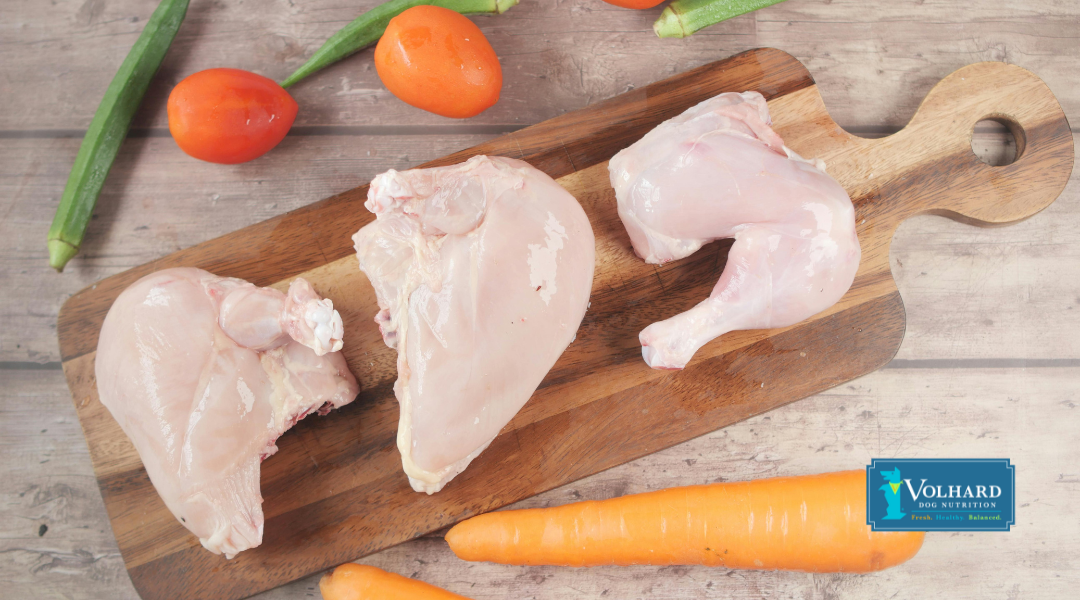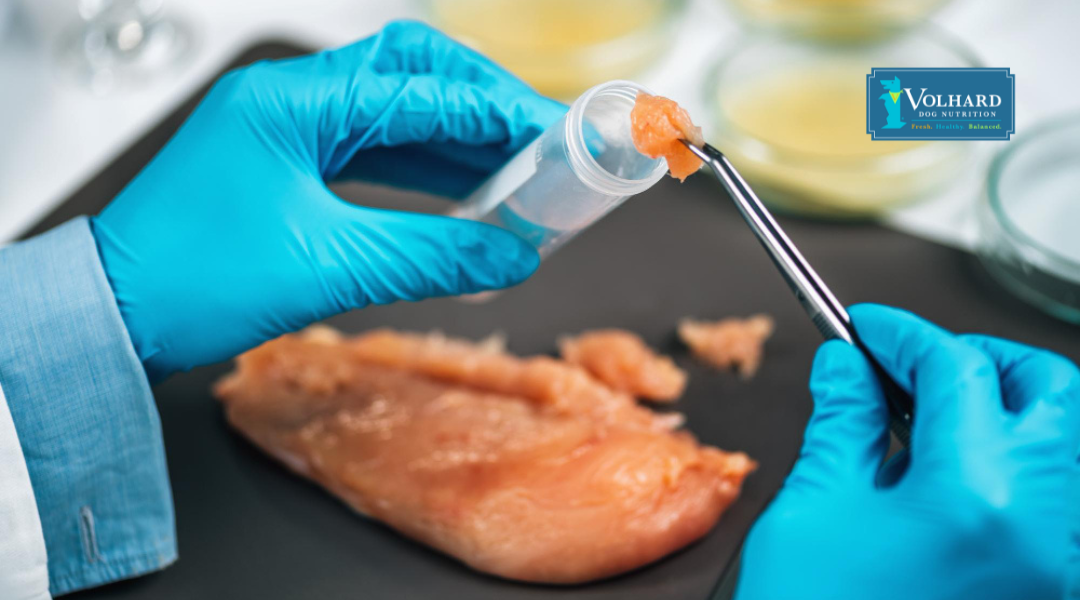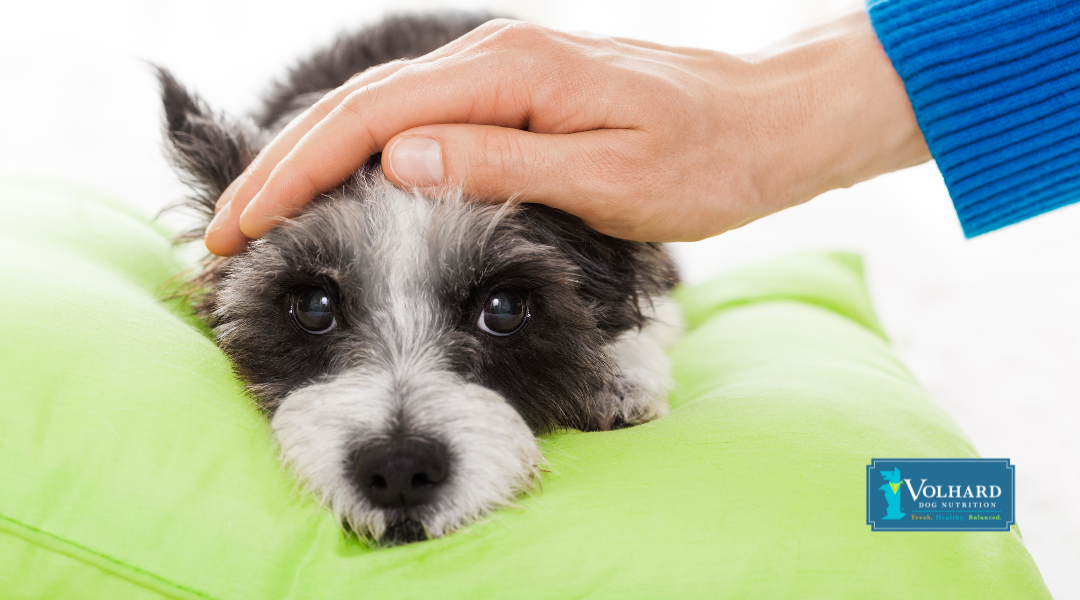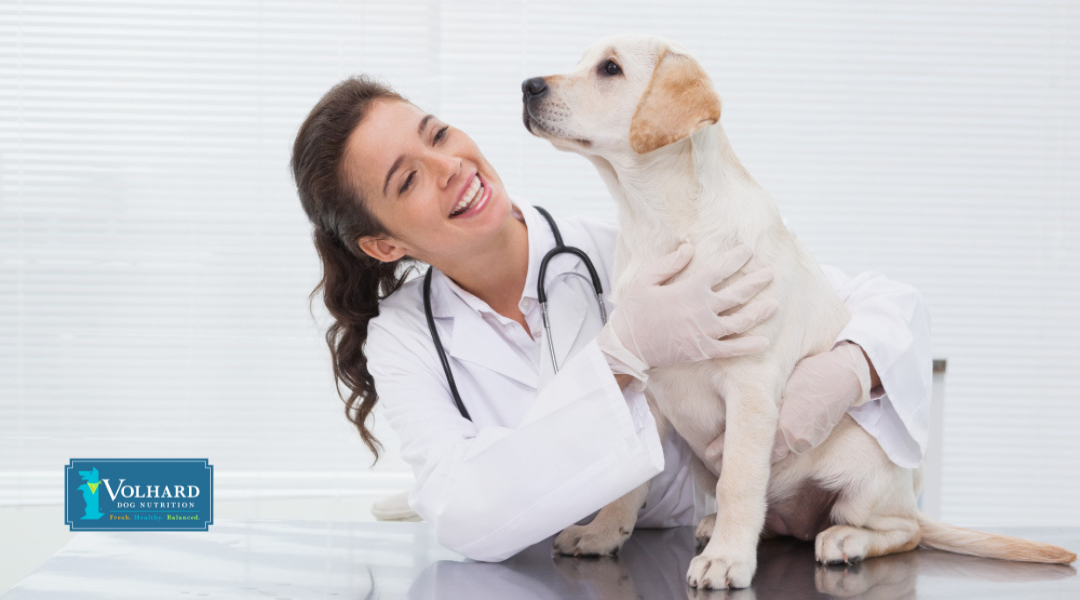Can Dogs Get Salmonella?
Posted by Volhard Dog Nutrition on Feb 28th 2023
Just like us, dogs can get salmonella infections, also known as salmonellosis, which affect their gastrointestinal tract.
Scientists have identified more than 2,500 strains of Salmonella, with Salmonella typhimurium being the type most commonly found in dogs.
While around 20% of healthy dogs may carry Salmonella without showing any symptoms, others can develop diarrhea, fever, and even more serious complications, such as weight loss or even miscarriages, if the infection goes untreated.
Why Most Dogs Can Handle Bacteria Like Salmonella
Dogs have gastrointestinal tracts that are designed with many unique features that prevent pathogenic bacteria such as Salmonella and E. coli from taking over their body and upsetting the healthy balance of intestinal flora.
A dog’s saliva contains digestive enzymes with natural antibacterial properties that help neutralize harmful microorganisms before they enter the digestive system.
Any remaining bacteria that do reach the stomach are destroyed by strong hydrochloric acids, which create an extremely low pH environment (around 1 to 2). This acidity, specific to carnivores, activates enzymes that kill residual bacteria before they can make their way into the gut.
This means that healthy dogs are well equipped to safely consume raw proteins when fed a balanced diet and when owners follow sensible food handling practices.
How Do Some Dogs Get Salmonella Poisoning?
While some dogs naturally carry Salmonella in their gastrointestinal tract, infection most often happens when they are exposed to contaminated food or the feces and saliva of an infected animal. Just like humans, dogs can contract salmonellosis from improperly stored or handled food, including dry kibble, canned food, or raw diets that aren’t kept at the correct temperature.
Risk Factors That Make Dogs More Susceptible
Not every dog exposed to Salmonella will become sick. Several factors increase the likelihood of infection, including:
- Age: Puppies and senior dogs have weaker immune systems, making them more vulnerable.
- Stomach acidity: An unbalanced gut microbiome or certain medications can reduce stomach acidity, which normally helps protect dogs against infection.
- Medical treatments: Antibiotics, chemotherapy, and steroids can compromise immunity.
- Overall health: Poor nutrition, high stress levels, cancer, or other concurrent diseases can all increase risk.
Salmonella Affects Dogs Differently Than Humans
Although Salmonella can cause severe illness in dogs, it’s generally less dangerous for them than for humans. The canine stomach is naturally more acidic, which makes it harder for the bacteria to thrive. However, when acidity is lowered, whether by medication, poor diet, or illness, dogs become more prone to infection.
Only a veterinarian can confirm salmonellosis through proper testing, and treatment may require both medical care and supportive home remedies to aid recovery.
Where Do Dogs Pick Up Salmonella?
Salmonella can spread between dogs and from the environment in a few key ways:
- Contaminated food and water: The unsafe handling of raw or undercooked meat, improperly stored pet food, and dirty water bowls are common sources.
- Feces or saliva from infected animals: Dogs can shed the bacteria even without symptoms, which is why it’s important to prevent your dog from coming into contact with another dog’s poop or saliva.
How Do I Know if My Dog Has Salmonella Poisoning?
The most obvious Salmonella infection sign is acute diarrhea (i.e., which starts out of the blue, without any apparent reason), particularly with mucus in the stool.
Other symptoms of Salmonella include:
- Anorexia
- Decreased appetite
- Dehydration
- Fever
- Lethargy
- Vomiting
Bringing these symptoms to your veterinarian's attention is essential, as they can worsen the infection. An untreated Salmonella infection can lead to serious health issues, such as:
- Abnormal vaginal discharge
- Abnormally fast heart rate
- Swollen lymph nodes
- Miscarriages in pregnant dogs
Can Humans Get Salmonella From Dogs?
Yes, humans can contract Salmonella from dogs, especially when certain hygiene practices aren’t followed. Dogs infected with Salmonella may shed the bacteria in their feces, saliva, or through contaminated surfaces, and even if a dog shows no symptoms, it can still be contagious.
How Transmission Happens
Here are some ways the bacteria can pass from dogs (or their environment) to people:
- Touching a dog’s feces or cleaning up after them without washing hands immediately afterward.
- Letting a dog lick your hands, face, or food, especially if the dog has been in a dirty or contaminated area.
- Coming into contact with surfaces or objects contaminated by dog saliva, stool, or raw food.
- Sharing items like toys, leashes, bowls, or bedding that haven’t been properly cleaned after being exposed to Salmonella.
Who Is More at Risk
While anyone can get infected, certain people are more vulnerable:
- Young children
- Elderly people
- Pregnant women
- Individuals with weakened immune systems (e.g., due to illness or certain medications)
These groups may be more likely to develop serious complications if infected.
How to Reduce the Risk
You can significantly lower the chances of getting Salmonella from your dog by following some simple prevention steps:
- Wash Your Hands: Always after handling your dog, cleaning up after them, or touching things they’ve touched (bowls, toys, bedding).
- Clean and Disinfect: Regularly clean surfaces that come into contact with your dog’s food, waste, or saliva, especially outdoors or in areas where there’s more risk of contamination.
- Safe Pet Food Practices: Handle raw pet food with care: store it correctly, thaw and prepare it on surfaces separate from human food, and discard leftovers hygienically. Just like when you prepare meat for your family, you can avoid contamination by practicing sensible hygiene. Clean utensils, dishes, and surfaces used to prepare your dog’s food, and of course wash your hands and teach your kids to do the same. Also, make sure you buy your dog’s food from a reputable supplier who uses good quality meats. This ensures that the raw proteins you’re feeding are handled and processed safely, minimizing bacterial risks without compromising your dog’s health.
- Separate: Avoid letting your dog in areas where food is prepared or eaten if they’ve been exposed to feces or dirty water.
- Be Mindful in Public or Shared Spaces: When visiting parks, dog parks, kennels, or shared outdoor areas, try to minimize contact with unknown feces or unclean water sources.
What To Do if Your Dog Has Salmonella
An integrative approach to treating salmonellosis is two-fold. First, you want to treat the active infection, and second, you want to strengthen and heal a dog's GI tract, so bad bacteria do not flourish in the future.
Treating an active infection in your dog may include fluids and electrolytes to avoid dehydration. Additionally, giving your pet colostrum and probiotics or fermented foods will help heal your dog's GI tract and allow the good bacteria to flourish and restore balance.
Bovine colostrum provides a natural and powerful healing food for your dog's gut and entire body. Colostrum provides immune factors necessary to protect and rebuild the gut lining and the immune system. It also provides growth factors for the body to repair and heal. It is ideal to use a liposomal form of colostrum, which allows for optimal delivery and absorption of these specialized nutrients in the gut.
How Do You Treat Salmonella in Dogs?
Since there's no effective home fix for it, the safest course of action for treating Salmonella is to see a medical professional. During the consultation, your vet will look for symptoms associated with the infection, such as gastroenteritis, lethargy, dehydration, chronic fever, etc. It would be helpful to keep a log of your dog's symptoms prior to the vet visit.
Your vet may analyze your dog's urine and fecal samples and conduct blood cultures to rule out parasitic infections, such as E. coli or other common bacteria.
Salmonella infection treatment generally involves outpatient treatment in the shape of antimicrobials and rehydration. However, severe cases may require inpatient treatment, especially for sepsis, blood infection, and severe dehydration diagnoses.
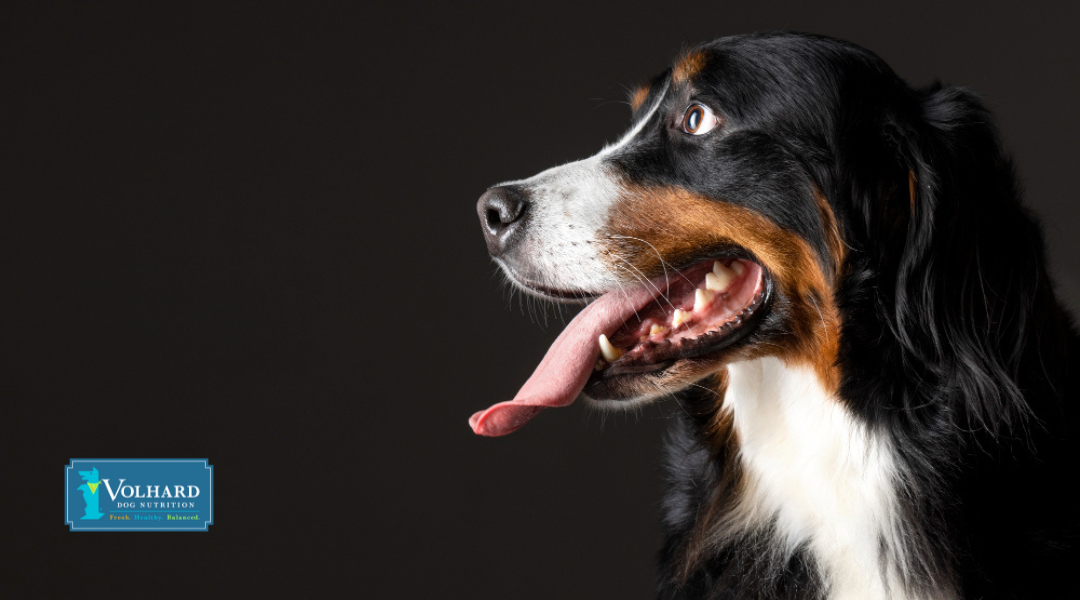
FAQs About Salmonella and Food Poisoning in Dogs
Can I still feed my dog raw chicken or bones?
Raw bones can be offered safely when handled with care. Raw bones should always be chosen, stored, and supervised responsibly to protect your dog’s health.
Cooked bones should never be fed to dogs. Once cooked, bones become brittle and can splinter, leading to broken teeth, intestinal blockages, or even life-threatening injuries like peritonitis.
- Choose the right size: Pick a bone about the size of your dog’s head to minimize choking hazards.
- Supervise chewing: Never leave your dog alone with a bone, and limit chewing sessions to 10–15 minutes.
- Store properly: Refrigerate bones between chew sessions and discard them completely after 3–4 days.
- Avoid risky bones: Skip marrow bones for dogs prone to pancreatitis, and don’t give bones to dogs with extensive dental work or those that gulp instead of chew.
- Source carefully: Purchase raw bones only from a trusted butcher with locally sourced, high-quality meat.
- Watch the clock: Even safe bones should be discarded after two hours if left out, as bacteria can multiply quickly.
- Handle like raw meat: Wash your hands and clean any surfaces that come into contact with the bone to prevent cross-contamination.
When sourced and handled properly, raw chicken, turkey, lamb, or beef bones are generally soft enough for dogs to chew and digest.
How long does food poisoning in dogs last?
Mild cases of food poisoning may resolve in 24–48 hours with supportive care, while more serious infections like salmonella can last weeks without treatment. Recovery depends on your dog’s age, immune system, and how quickly veterinary care is provided.
Can dogs get food poisoning from dry kibble?
Yes. Although less common than raw meat, contaminated commercial pet food, both kibble and canned, has been linked to Salmonella outbreaks. Always check recall notices and store food according to the manufacturer’s instructions.
Can dogs get salmonella from humans?
Yes. Dogs can contract Salmonella from humans (this is called reverse zoonosis). If a person in your household is infected, avoid close contact such as sharing food, kissing, or letting your dog lick your hands until you are cleared.
How do I know if my dog’s upset stomach is food poisoning or something else?
Food poisoning often shows up as sudden vomiting, diarrhea, and lethargy after eating questionable food. However, other conditions, parasites, dietary intolerance, or pancreatitis, can mimic these symptoms. Only a vet can make a proper diagnosis.
What should I feed my dog while they recover from food poisoning?
Veterinarians often recommend bland, easily digestible foods such as boiled chicken (boneless, skinless) and plain rice, alongside hydration and probiotics. Always follow your vet’s guidance, especially for puppies, seniors, or dogs with underlying health issues.
Is food poisoning in dogs fatal?
Most healthy adult dogs recover from food poisoning with prompt care, but untreated cases can lead to severe dehydration, sepsis, or even death, especially in puppies, senior dogs, or those with compromised immune systems.
Protect Your Pup From Food Poisoning: Choose Safe Nutrition!
For more advice on dog nutrition, health, and training, contact us and check out our other blogs!
Volhard Dog Nutrition and its expert canine nutrition coaches offer online consultations to help more dog parents discover why and how to feed their dogs the healthiest foods!
Speaking to a Volhard canine nutrition coach will help you understand the inseparable relationship between healthy food, a healthy body, and a healthy mind.
If you want to contact one of our Volhard canine nutrition coaches, don't hesitate to access our consultation page!
References:
Bedale, Wendy, Andrew L. Milkowski, and the AMSA Scientific Information Committee. Salmonella Fact Sheet. American Meat Science Association, 2015. PDF file, https://meatscience.org/docs/default-source/publications-resources/fact-sheets/salmonella-fact-sheet-2015.pdf?sfvrsn=0.
Bourin, Michel, and Alain Porsolt. "A Forced Swimming Test in Mice: A Useful Tool for Research on Antidepressants." European Journal of Pharmacology, vol. 47, no. 4, 1978, pp. 379-391. PubMed, https://pubmed.ncbi.nlm.nih.gov/1102502/.
Centers for Disease Control and Prevention. "Salmonella and Dog Food: What Pet Owners Need to Know." CDC, 15 May 2012, https://www.cdc.gov/salmonella/dog-food-05-12/pet-owners-info.html.


